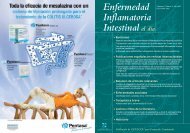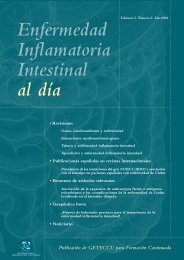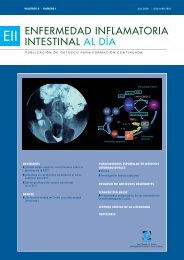Número 1 - EII al dÃa
Número 1 - EII al dÃa
Número 1 - EII al dÃa
You also want an ePaper? Increase the reach of your titles
YUMPU automatically turns print PDFs into web optimized ePapers that Google loves.
RESUMEN DE ARTÍCULOS RELEVANTES<br />
J. Hinojosa<br />
Hospit<strong>al</strong> de Sagunto. V<strong>al</strong>encia. España<br />
Safety of celecoxib in patients with ulcerative colitis in<br />
remission: a randomized, placebo-controlled, pilot study<br />
Seguridad de celecoxib en pacientes con colitis ulcerosa en remisión: un<br />
estudio piloto <strong>al</strong>eatorizado, controlado con placebo<br />
Sandborn W, Stenson F, Brynskov J, Lorenz R, Steidle G, Robbins J, Kent, Bloom B<br />
Clin Gastroenterol Hepatol 2006;4(2):203-11.<br />
Resumen<br />
Estudio multicéntrico, doble-ciego, controlado frente a placebo que an<strong>al</strong>iza la seguridad de un inhibidor selectivo de la COX-<br />
2, el celecoxib, en el tratamiento de los dolores articulares en pacientes con colitis ulcerosa en remisión. Se randomizaron 217<br />
pacientes a recibir placebo (107 pacientes) o celecoxib 200 mg/12 horas (110 pacientes) durante 14 días. La ev<strong>al</strong>uación de la<br />
recidiva se re<strong>al</strong>izó mediante el índice de Mayo (<strong>al</strong> menos 5 puntos) y la subesc<strong>al</strong>a endoscópica del mismo (<strong>al</strong> menos un punto).<br />
4 de los 107 pacientes del grupo placebo (4%) y 3 de los 110 del grupo celecoxib (3%) presentaron una recidiva de su enfermedad<br />
(p=0,72). 11% de pacientes de cada grupo tuvieron <strong>al</strong>gún otro efecto secundario gastrointestin<strong>al</strong> no relacionado con<br />
reactivación de su enfermedad intestin<strong>al</strong>. No se observaron efectos secundarios graves, incluyendo manifestaciones cardiovasculares.<br />
Los autores concluyen que el tratamiento con celecoxib durante 14 días es seguro no asociándose aun aumento del<br />
riesgo de recidiva de la enfermedad intestin<strong>al</strong>.<br />
Summary<br />
The safety of selective cyclooxygenase- 2 inhibitors in patients with ulcerative colitis in remission is unknown. We performed a<br />
placebo controlled pilot tri<strong>al</strong> to ev<strong>al</strong>uate the safety of celecoxib in patients with ulcerative colitis in remission who had a present<br />
or past history of nonspecific arthritis, arthr<strong>al</strong>gia, or other condition amenable to nonsteroid<strong>al</strong> anti-inflammatory drug therapy.<br />
A tot<strong>al</strong> of 222 patients with ulcerative colitis in remission were randomized to receive or<strong>al</strong> celecoxib 200 mg or placebo<br />
twice daily for 14 days. Remission was defined as a tot<strong>al</strong> Mayo Clinic score of 2 points or less and an endoscopic score of 1<br />
point or less. Disease exacerbation was defined as a tot<strong>al</strong> Mayo Clinic score of 5 points or more and an increase in the endoscopic<br />
score of 1 point or more. The primary an<strong>al</strong>ysis was disease exacerbation through day 14 among patients who underwent<br />
randomization, had at least 1 dose of study drug, and had both endoscopy and Mayo Clinic disease activity index scores at the<br />
baseline and fin<strong>al</strong> assessments. Three percent of patients in the celecoxib group experienced disease exacerbation through day<br />
14, as compared with 4% in the placebo group (p=719). Eleven percent of patients in each group experienced a bowel-related<br />
adverse event (p>20). Conclusions: Therapy with celecoxib for up to 14 days did not have a greater relapse rate than placebo<br />
in patients with ulcerative colitis in remission who had a present or past history of nonspecific arthritis, arthr<strong>al</strong>gia, or other<br />
condition amenable to nonsteroid<strong>al</strong> anti-inflammatory drug therapy.<br />
P<strong>al</strong>abras clave: celecoxib, colitis ulcerosa en remisión, artr<strong>al</strong>gia, estudio de seguridad<br />
Keywords: celecoxib, ulcerative colitis in remission, arthr<strong>al</strong>gia, safety study<br />
Comentarios<br />
Hay dos isoformas de la ciclooxigenasa (COX), la 1 y 2.<br />
Los inhibidores selectivos de COX-2 tienen menos efectos<br />
secundarios gastrointestin<strong>al</strong>es en la población gener<strong>al</strong>,<br />
aunque hay dudas sobre su seguridad de utilización<br />
en los pacientes con enfermedad inflamatoria intestin<strong>al</strong><br />
(EICI). En este estudio multicéntrico, doble ciego,<br />
controlado frente <strong>al</strong> placebo se an<strong>al</strong>iza la seguridad<br />
del celocoxib (200 mg/12 h), un inhibidor selectivo de la<br />
COX-2, administrado durante 14 días en pacientes con<br />
colitis ulcerosa en remisión. Todos los pacientes se encuentran<br />
en remisión clínica (indice de Mayo ≤ 2 pun-<br />
40 • Enfermedad Inflamatoria Intestin<strong>al</strong> <strong>al</strong> día - Vol. 6 - Nº. 1 - 2007











